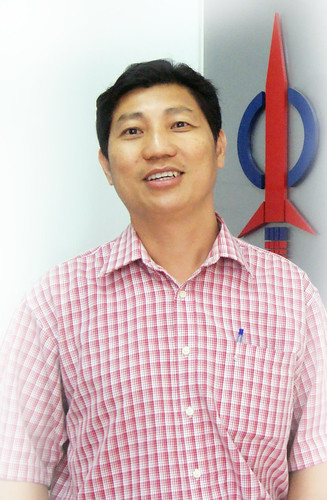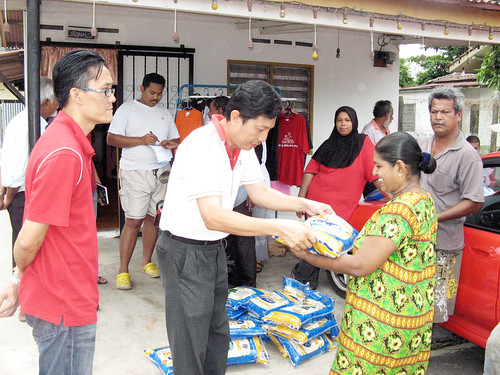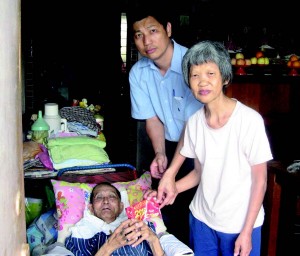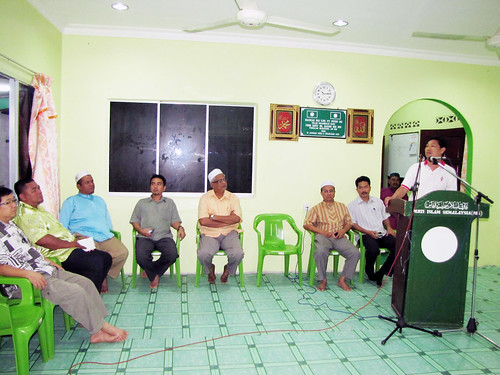 The Rocket took a tour down to the historic city of Melaka to get to know the state DAP chairman and state assemblyman for Kesidang, Goh Leong San. He shared his views on the key issues facing Melaka, the prospects of Pakatan Rakyat in the state and the future of DAP as a whole.
The Rocket took a tour down to the historic city of Melaka to get to know the state DAP chairman and state assemblyman for Kesidang, Goh Leong San. He shared his views on the key issues facing Melaka, the prospects of Pakatan Rakyat in the state and the future of DAP as a whole.
Full name: Goh Leong San
Education: Bachelor of Science and Master of
Science in Chemistry, Universiti Sains Malaysia
State DAP Post: State Chairman
State Assembly Representative since: 1995
Other Activities: Household products manufacturing
Age: 43
Tell us about yourself and what you are currently doing?
I was born and bred in Melaka. I completed my tertiary education at Universiti Sains Malaysia in Penang, obtaining a Bachelor and Master degrees in Chemistry. I was working as a chemist before taking the plunge into politics.
As for my personal life, I am married and am a father of three children. I am also currently involved in manufacturing household products.
As for my political career, it all started in 1995, when I stood as a candidate for the first time in the Tengkera state seat. I contested in Tengkera in 1999, changing to Bandar Hilir in 2004. I contested again in Tengkera (now renamed Kesidang) in 2008.
What motivated you to join politics?
While I was a student in Penang, it was a time of political upheaval in the nation. I became interested in and followed the political scene in Penang closely. Incidentally, Penang was witnessing a keen contest for the forming of the state government between BN and DAP. I would avidly attend the DAP ceramahs during the 1990 general elections and this stirred up my interest in politics.
At the same time, I was also being impacted by the government’s implementation of the NEP (New Economic Policy). As I was about to graduate with my Masters degree in chemistry, I applied to be a lecturer but I was denied the opportunity to do so as the university was making it hard for non-Bumiputeras to apply for the lecturer’s post. I felt that something was wrong with the government policy as any qualified and capable graduate should be able to be considered for any occupation he chooses and not be denied the chance simply due to his racial or religious background.
As the sense of being wronged well up in me, I felt the urge to fight for this injustice which would surely be causing hardship for others as well. So I joined DAP in 1994 and started as a volunteer in Melaka DAP, helping to translate some news articles and doing preparation work for the 1995 general elections. I was an assistant in DAP Secretary General Lim Guan Eng’s office then.
Why did you choose DAP? What were the aspects of the party that stood out for you?
I did not consider BN as I saw that the mismanagement of the country was due to their governance and stance. So I felt it was necessary for me to choose a party that had people who would fight to right the wrongs in the system and to have the support from the people in their cause.
As DAP was fighting based on the ‘Malaysian First’ concept, I saw an ideal which I could identify with. As a Malaysian, I think we all deserve to be granted equal rights. This was the main appeal for me and it made DAP a natural choice.
What are some of the challenges that an elected representative faces every day?
One key challenge is raising awareness amongst the people on the issues of the day; we often encounter a resistant attitude from them as the BN-controlled media does a very good job of blanking out the government’s bad news.
Two examples that comes to mind are the Paya Mengkuang 2007 closure of pig farms and the Tanah Merah forced land acquisition by the state government in ‘94/’95. We were trying to distribute leaflets to the people to inform them about these issues, but the people were apprehensive about receiving things from DAP as the fear of being associated with the opposition parties was strong. This is still visible amongst some of the older folks even to this day. I also received similar treatment when I was contesting for the Alor Gajah parliamentary seat in 2004.
This “paranoia” of the opposition parties sometimes grips the people so much and can be seen in the fundraising dinner attendance. Some have told me they do not dare to attend fundraising dinners held by DAP for the fear that they might be seen and have their pictures taken by the Special Branch (SB) police. They believe that they would be spied upon and then hassled in their daily affairs. 
What is the political landscape in Melaka now? How have things changed in the last two years?
After the March 2008 elections, there has been a visible change in the people’s attitude towards the opposition parties. They are more willing to consider what we tell them. Many of the independent (non-partisan) voters are beginning to believe that DAP can form government and be effective in fulfilling our promises.
In the past, we were quite conservative in our political expectations; we were only telling the people that we will attempt to be a better and more effective opposition. The thought of forming the government even at the state level was far from us.
Now, with DAP forming the state government in Penang, Melaka folks are seeing for themselves the capabilities of DAP leaders. The DAP-led Penang state government is often held up as a good example by the people. They are remarking on Lim Guan Eng’s stellar performance in running the state government which has generated a budget surplus and returned the money to the people. Of course, even with all these positive external factors, we still need to work well with our Pakatan Rakyat (PR) partners to keep the momentum going.
What are the biggest issues that are affecting the political scenario in Melaka?
The BN Melaka state government, in power since Merdeka, has generated enough problems on its own. On the surface, Melaka seems to be out of the bad press. However, with people’s political awareness raised since 2008, they are beginning to question on the efficacy and integrity of this UMNO-led government.
One prominent example is the reputation of the current Melaka Chief Minister. He was indicted in the 2009 UMNO party elections for unethical campaigning. Though he may have been cleared of any wrongdoing, the people’s perception towards his integrity has deteriorated.
In the past the politics of development had a strong hold on the people’s mindset. The people genuinely believed that only BN could bring development to the country. As a result, BN was milking this sentiment for all that it was worth.
After the 2008 political tsunami, the people’s way of thinking about the politics of development has changed. They accept that development is only one small part of good governance. They are also beginning to see that development comes from taxpayers’ money and not by the grace of the government. So the effectiveness of using development as a weapon by BN is somewhat blunted now.
Moving on to the micro level, we see several issues that may occupy the people’s concern. One example is the housing quota for the bumiputera population, which currently stands at 60 percent, one of the highest in the country. The BN controlled media and Kedah BN elected representatives were making a fuss about the proposed 50 percent bumiputera housing quota in PR-led Kedah; Melaka has been practising this 60 percent for years already.
Now, as a result of this policy, we have 1,489 houses left unsold throughout the state. The estimated value of these houses comes to about RM150 million. The state government refused to allow them to be sold at the open market. To appease the developers, the state government agencies were directed to acquire them using taxpayers’ money and bank loans and then rent them out to tenants. For a small state such as Melaka, which has state budget and revenue of around RM300 million, this figure is substantial.
In addition, we have many failed projects that are scattered throughout the state. We have the Batu Berendam International Airport, which has just two flights a day to one destination in Indonesia. Yet it has cost the taxpayers millions of ringgit.
 We also have the infamous failed “Eye on Malaysia” project, the Malacca International Motorsports Circuit (MIMC) in Durian Tunggal, a go-kart racing track which claims to be the biggest in the South East Asia region but is in fact under-utilised and another international bowling centre which has been taken over by a state government agency which is under-utilised as well.
We also have the infamous failed “Eye on Malaysia” project, the Malacca International Motorsports Circuit (MIMC) in Durian Tunggal, a go-kart racing track which claims to be the biggest in the South East Asia region but is in fact under-utilised and another international bowling centre which has been taken over by a state government agency which is under-utilised as well.
In Melaka city itself, the flood problems have been plaguing the city centre for the past few years. Due to massive land reclamation project around the town area, water drainage for rain requires a longer distance to reach the sea. The state government has recently declared Melaka as a developed city, yet flash floods are a recurrent event in the town. How do they justify this declaration?
To understand the magnitude of these flash floods, we can see that the state government has been compensating the people by providing a RM200 grant to each house affected by the floods, for a total RM40.9 million from 2004 to 2010. That comes to an average of over 34,000 households being affected by the floods over the past six years.
Recently, Melaka DAP was in the news for voicing out about the malpractice in the distribution of these compensations. We were submitting the compensation claims on behalf of the households affected by the floods; however due to political considerations, the government departments did not process the claims we sent as they chose to only process those submitted by the JAPERUN (State Legislative Assembly Development and Coordination Committee) or JKKK (Village Development and Security Committee). We held a demonstration in front of the house of the MCA state executive committee member responsible for the disbursement of this flood compensation grants.
These flash flood problems are not just confined to Melaka city. Many people think it is a problem mostly faced by the residents in the opposition controlled areas but it also frequently affects the smaller towns such as Jasin and Masjid Tanah, which are pro-BN.
What are the people’s perceptions toward Pakatan Rakyat in Melaka?
The enthusiasm of the people towards PR is growing. Some of the people are keen for the next general elections to come so that they can vote for a new government. We are confident that the Chinese and Indian communities are generally supportive of PR. As for the Malay voters, most of our votes will be coming from the PAS voter base.
Generally for the fence sitters, many have indicated that they want to see PR form the next state government.
Based on the people’s sentiments, what are the prospects of PR advancing politically in Melaka?
From analysing the voting trends in 2008, we managed to obtain about 20 percent of the Malay votes, over 75 percent of the Chinese votes and a fairly high percentage of the Indian votes in the areas we contested.
Now in this new political environment, we estimate that with an additional 10 percent voters swing to PR, we will be able to win some of the UMNO-controlled state seats. This will especially aid PAS in winning some of these UMNO seats. Melaka city and southern Melaka state seats such as Durian Tunggal, Telok Mas, Ayer Molek, Merlimau, and Sungai Rambai also look promising for PR.
In 2008, DAP contested two parliamentary and eight state seats. We won one parliamentary and five state seats. If 10 percent more of the voters would swing to our side, we stand a good chance of capturing two more state seats, namely Kelebang and Duyong.
As for our chances of forming the next state government, I think we are still pretty far from reaching that stage. We would need to work doubly hard to close the gap between us and BN. However, if the current political climate continues, we stand a good chance of denying BN the two-thirds majority in the state assembly.
Overall, there are some macro factors that may swing the outcome for us. Melaka is a fairly developed state with a high number of urban residents. Generally, urban voters’ nationwide are geared towards voting for opposition parties. However in Melaka’s case, the pro-BN sentiment is still very strong amongst the voters, even in the newly developed townships. We hope that the Melaka people working out of town, especially in the big cities, would begin to influence the thinking of their parents and relatives in politics and voting. This could be the catalyst for more changes in the political scene.
What are the hurdles that PR has to overcome?
Generally, we have a good working relationship with the PR parties. We have been holding many ceramahs and talks which we often invite other PR party leaders to speak in. There is a sense of team spirit building up. However, some difficult matters still need to be ironed out.
In the past, for many of the seats that were pro-BN, especially those outside of Melaka city, the opposition parties generally just post candidates in the seat to contest in order to prevent BN from having a walkover win without regard to the quality of the candidates. This was especially true before 2008. Now with the evolving political scenario, it becomes crucial to have good and qualified candidates to stand in these areas. PR is still facing problems in this aspect.
In terms of electioneering work, the strategies discussed amongst the state PR leaders have to be translated into actions on the ground. Each component party needs to work hard in pushing through the strategies. The PR leaders have to instil confidence amongst the grassroots members of their leadership and to meet them more frequently, not just during elections.
Amongst the three PR parties, PKR is the weakest link. We hope they will buck up in their efforts to improve on their organisation and electioneering work. We can only give suggestions; the rest is in their hands.
We do consider the fact that PKR is still a young party. We have been through the same path as they did, with some of our past and present elected representatives having jumped parties too. We, too, have members quitting the party in a huff. We understand they are going through a growing up phase as well. But they need to pull together and work hard in their assigned areas.
What are the challenges for DAP to progress ahead? What are the solutions?
 In the past, it was quite difficult to convince many people that DAP is a multi-racial party. We were having difficulty in attracting people from diverse ethnic and religious background to join the party, especially the Malays. This was due to the misperception created by the BN-controlled media. They did a good job in scaring the Malays into thinking that if DAP were to come to power, the Chinese would control the state and their rights will be taken away. Now with this changing environment, it gives us a better opportunity to be able to reach out to the Malay community.
In the past, it was quite difficult to convince many people that DAP is a multi-racial party. We were having difficulty in attracting people from diverse ethnic and religious background to join the party, especially the Malays. This was due to the misperception created by the BN-controlled media. They did a good job in scaring the Malays into thinking that if DAP were to come to power, the Chinese would control the state and their rights will be taken away. Now with this changing environment, it gives us a better opportunity to be able to reach out to the Malay community.
In the past, we had many Malay sympathisers. However, they had to maintain a low profile as it was a stigma within the Malay community to be identified as a DAP supporter. Many of them were ostracised for their overt support for DAP, causing some difficulties in their daily lives.
Now as DAP is a part of PR, it is no longer a taboo for the Malays to openly support us. In addition, with the availability of the Internet news and blogs, DAP is able to explain on what we stand and fight for. It is a good platform to attract more Malays and Indians to join us.
However, there are still some challenges as well. We have been trying to attract more Indian and Malay members, but we are facing competition from other parties such as PKR and PAS.
As for us in Melaka, we have been embarking on reaching out to the Malays through various programs. One example is the rice donation program for residents in Taman Pandan Mawar, which is a predominantly Malay area near our state headquarters. 800 packets of rice were contributed by a DAP supporter and given out to the residents during the recent flash floods. We are seeing some results from these efforts.
Nowadays, the Malays are getting more receptive towards us when we approach them. We have been using Balai Islam, which are owned by PAS, to reach out to the Malays. We have also been regularly donating goods for their festivities such as Hari Raya Aidilfitri and Aidiladha, which they have received with open hearts.
To give an indication of this increasing receptivity amongst the Malays towards DAP, we use the example of our state party headquarters office. In the past, it was very rare for any Malay to approach the office to request for any assistance. After 2008, some of the Malay residents in this area have been approaching us to request for help in applying for such things as welfare assistance from the government. Some have even asked us to assist them in applying for “wang khairat” (welfare aid) from the state religious department. Even though we are not able to sign the forms on their behalf, we believe every effort matters in reaching out to them. -The Rocket



